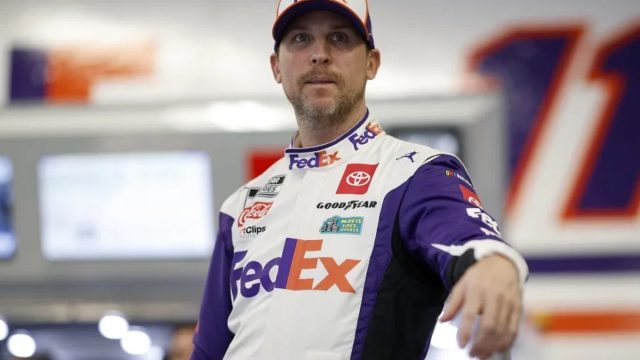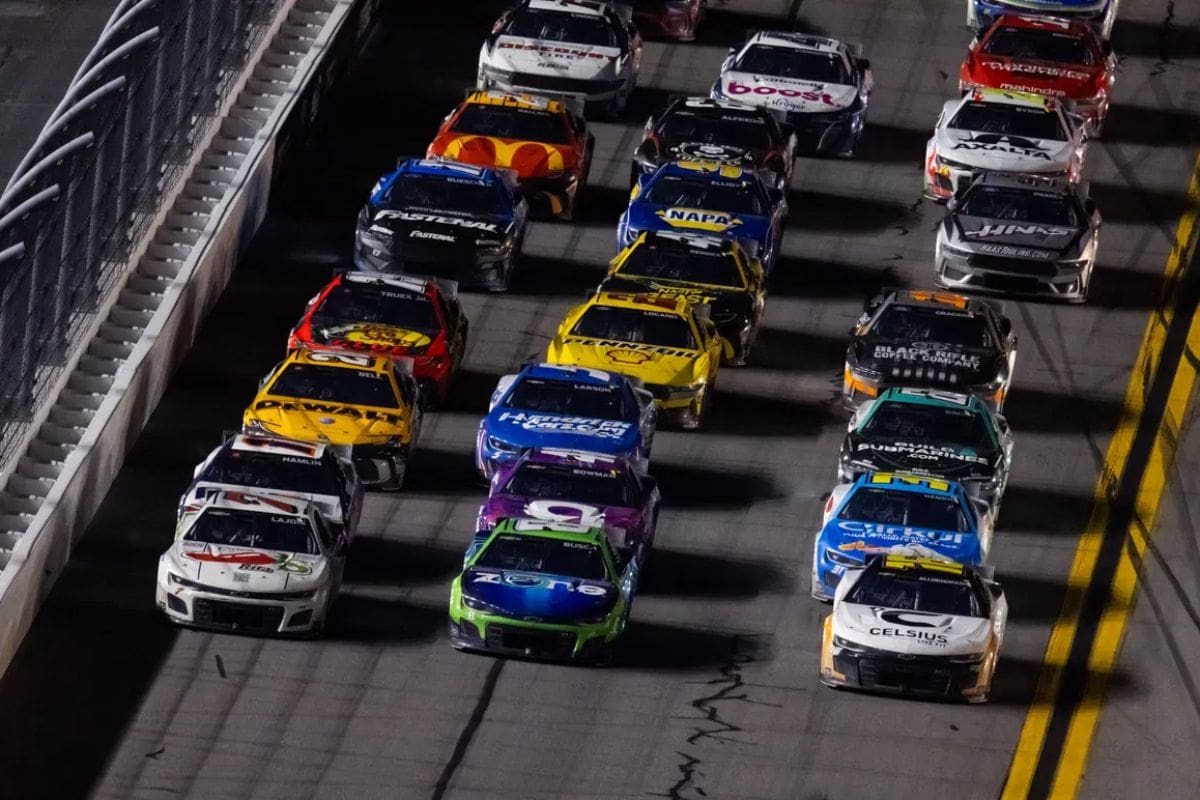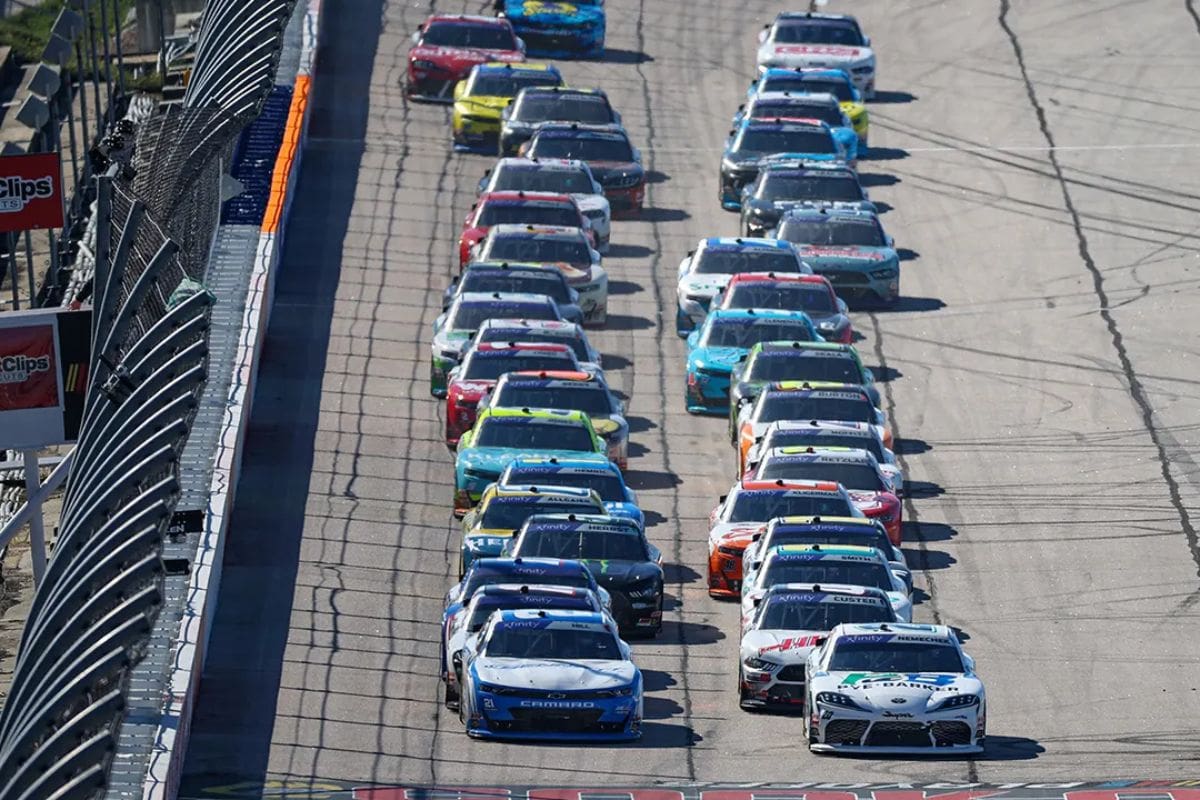Denny Hamlin Accuses NASCAR of prioritizing larger teams at the expense of smaller ones in a toxic sponsorship model, raising alarms about the future of the sport. As big NASCAR teams thrive and small ones struggle, fans are left wondering what this means for the races they love. With major NASCAR teams like Stewart-Haas Racing facing tough decisions, the survival of NASCAR’s competitive spirit is at stake. Will changes come in time, or will the sport we adore be forever changed?
Key Highlights
- Denny Hamlin criticizes NASCAR’s reliance on sponsorships, arguing it favors larger teams and undermines the competitiveness of smaller teams in the NASCAR landscape.
- The current NASCAR sponsorship model contributes over 80% to team revenues, creating financial instability, especially for underfunded teams.
- Hamlin’s concerns reflect broader discontent in the NASCAR racing community about the inequitable distribution of financial resources among teams.
- Legal challenges from teams like 23XI Racing highlight the urgent need for NASCAR to reassess its financial framework for equitable support.
- Without a diversified revenue model, NASCAR risks the homogenization of competition, threatening fan engagement and the overall health of the sport.
Jimmie Johnson’s Stark Words Ring True in NASCAR’s Current Climate
In the current climate of NASCAR, where financial uncertainty looms large, NASCAR driver Jimmie Johnson‘s candid reflection serves as a poignant reminder of the sport’s shifting dynamics. Johnson’s assertion that “the best thing to be is NASCAR, the next best a driver, and the last thing a team owner” encapsulates a growing concern among stakeholders regarding the viability of NASCAR team ownership in the face of escalating costs and dwindling revenues.
His words resonate particularly in view of the recent announcement from Stewart-Haas Racing, a stalwart in the NASCAR landscape, to cease operations after 16 successful years, emphasizing the fragility of even the most established NASCAR teams.
The implications of Johnson’s commentary extend beyond mere sentiment; they highlight a systemic issue within NASCAR’s economic framework. As the sport grapples with a toxic sponsorship model, smaller NASCAR teams find themselves increasingly marginalized, struggling to secure the financial backing crucial for competitiveness.
This sentiment is echoed by NASCAR driver Denny Hamlin, who confronts similar challenges with 23XI Racing, indicating that the issues are not isolated but rather indicative of a broader trend affecting NASCAR team ownership across the board.
Consequently, Johnson’s insights serve as a clarion call for a reassessment of NASCAR’s economic strategies. The sport must prioritize the sustainability of its teams to guarantee a balanced competitive landscape.
Without such a recalibration, the future of NASCAR risks becoming a battleground for an elite few, undermining the foundational diversity that has historically defined its appeal.
23XI Racing and Front Row Motorsports Risk It All in Legal Challenge
The financial instability plaguing NASCAR teams has prompted 23XI Racing and Front Row Motorsports to commence a substantial legal challenge against the organization. This unprecedented move reflects a growing discontent within the racing community regarding NASCAR’s sponsorship-dependent revenue model, which many believe disproportionately benefits larger NASCAR teams while marginalizing smaller franchises in the NASCAR landscape.
Denny Hamlin, co-owner of 23XI Racing, has emerged as a vocal critic of this model, arguing that it not only threatens the survival of underfunded teams but also undermines even the most successful participants in NASCAR.
The legal challenge undertaken by these NASCAR teams represents a calculated risk as they seek to address what they perceive as an inequitable distribution of financial resources within NASCAR. Hamlin’s assertion that the reliance on sponsorships leaves teams vulnerable resonates amid a backdrop of escalating operational costs and dwindling revenue streams in the sport.
NASCAR’s Unsustainable Revenue Model: Denny Hamlin’s Perspective
Recognizing the inherent risks of NASCAR’s financial framework, Denny Hamlin has articulated deep concerns regarding the sport’s reliance on sponsorships as a primary revenue source. During his “Actions Detrimental” podcast, Hamlin highlighted the precarious nature of team ownership within an economic model that disproportionately favors a select few.
The overwhelming dependence on sponsorships, which contribute upwards of 80% to team revenues, clearly contrasts with other major sports leagues such as MLB and the NHL, where sponsorships account for merely 8-12% and 17-18% respectively.
Hamlin’s insights suggest that this financial structure engenders an unstable environment for smaller teams, making it increasingly challenging for them to compete. The model not only perpetuates a cycle of inequality but also risks alienating potential investors and fans, who may question the sustainability of teams unable to secure lucrative sponsorships.
“I think that the only people that have sustained power in our sport forever are Penske and Hendrick. And its why they probably win the bulk of the races. Gibbs, you can definitely throw in there as well. But they’re the only ones that can sustain sponsorship because of the B2B that they leverage to get that.” – Denny Hamlin
In addition, it appears that only NASCAR team owners with diversified revenue streams, like Rick Hendrick and Roger Penske, can navigate these choppy waters successfully.
This reliance on sponsorships poses a fundamental question about the future viability of NASCAR as a whole. With the sport’s financial ecosystem increasingly tethered to corporate partnerships, the potential for collapse looms for those without the necessary infrastructure to weather economic downturns.
Hamlin’s concerns serve as a clarion call for a reevaluation of NASCAR’s revenue model, advocating for a more equitable system that prioritizes the longevity and competitiveness of all teams, regardless of their financial backing.
Sponsorship Decline Cripples NASCAR Smaller Teams as SHR Exits
NASCAR’s financial vulnerabilities have become increasingly apparent, particularly as NASCAR teams like Stewart-Haas Racing (SHR) confront the harsh realities of a declining sponsorship landscape. The withdrawal of notable sponsors, including Busch Light, Smithfield, and Gearwrench, highlights a troubling trend that not only jeopardizes the viability of SHR but also casts a long shadow over smaller NASCAR teams.
Denny Hamlin has articulated a growing concern regarding this toxic financial climate, noting its detrimental effects on competitiveness and investment across the spectrum. As the sponsorship landscape erodes, the fragility of smaller NASCAR teams is exacerbated, making it increasingly difficult for them to secure the necessary resources to compete effectively.
Hamlin’s assertion that the current model creates an environment where NASCAR teams are “so fragile” reveals a crucial insight into the structural weaknesses plaguing NASCAR. The exit of SHR from the sponsorship race highlights the glaring reality faced by many, as NASCAR team owners confront rising operational costs amidst dwindling financial support.
“It makes everyone else so fragile, which then makes it so hard to invest – which then makes it hard to perform. It’s just a snowball that happens in this business that makes it extremely difficult.”
“Tony has obviously been looking at things from the outside. And he’s like, this is a good time for me to check out.”- Denny Hamlin
This precarious situation not only threatens the survival of smaller NASCAR teams, but it also raises questions about the general integrity of the sport. Without a robust sponsorship framework, the competitive balance within NASCAR is at risk, potentially alienating fans and diminishing the quality of racing.
NASCAR’s Financial Instability Rooted in Long-Standing Revenue Issues
Amidst a backdrop of evolving economic challenges, the financial instability plaguing NASCAR can be traced to deep-rooted revenue issues. NASCAR’s historical reliance on sponsorship—a model that thrived during the sponsorship surge of the early 2000s—has since become a double-edged sword.
The 2008 economic recession marked a crucial turning point, as high gas prices, rising unemployment rates, and declining fan attendance severely disrupted the revenue streams. This tumultuous period has left NASCAR teams grappling with ongoing financial uncertainty, a situation worsened by the lack of a diversified funding approach.
Warnings from NASCAR executives, including notable figures like Jeff Gordon of Hendrick Motorsports, have highlighted the unsustainable nature of the current financial model. The precarious state of smaller NASCAR teams has been further emphasized by Curtis Polk of 23XI Racing, who foresees potential financial ruin for NASCAR teams like Stewart-Haas Racing (SHR) and others if their legal disputes against NASCAR do not yield favorable outcomes.
“Where we’re currently at is not sustainable.”
“The economic model is really broken for the teams. We’ve gotten to the point where teams realise the sustainability in the sport is not very long term. This is not a fair system.” – Curtis Polk
This precarious environment indicates that the financial landscape is not merely challenging; it is fundamentally flawed. As NASCAR navigates these turbulent waters, it must address its longstanding revenue issues to restore stability and guarantee the survival of smallerNASCAR teams.
Without a tactical overhaul, the sport risks losing its competitive diversity, jeopardizing its very essence. The future of NASCAR hinges on redefining its financial framework, moving beyond mere sponsorship dependency to a more resilient economic foundation.
News in Brief: Denny Hamlin Accuses NASCAR
The ongoing challenges faced by smaller NASCAR teams highlight a notable disparity within the sport’s financial ecosystem. Denny Hamlin’s criticisms emphasize the precarious nature of sponsorship reliance and the detrimental effects of an unsustainable revenue model.
The legal actions taken by NASCAR teams such as 23XI Racing and Front Row Motorsports exemplify the urgency for reform. Without addressing these systemic issues, the viability of smaller NASCAR teams and the general health of NASCAR remain jeopardized.
ALSO READ: Tyler Reddick’s Win Stings as Denny Hamlin Seeks to Claim the NASCAR Championship



